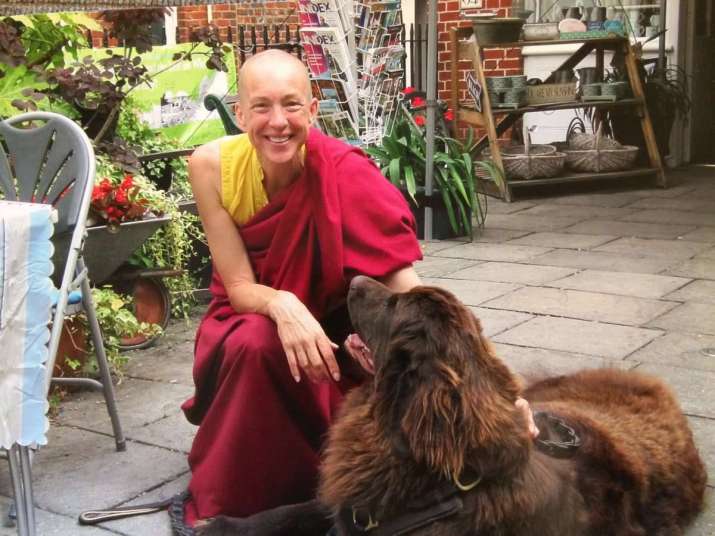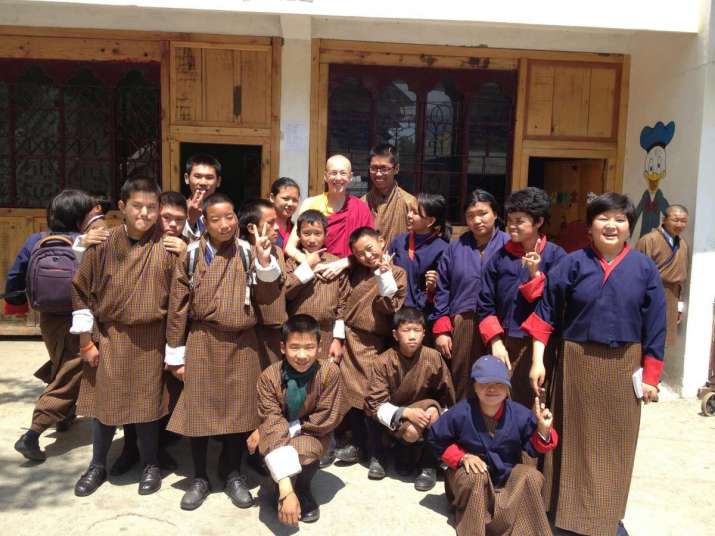FEATURES|THEMES|People and Personalities
The Path of Freedom: Pema Deki’s Thoughts on Liberating Spiritual Practice
 Pema Deki. From twitter.com
Pema Deki. From twitter.com“Freedom in Buddhist terms is to become free of ego-clinging, the mental force that leads to the states of attachment and aversion, which in turn generates endless karma.” To remove the mental causes of karma, which propels us along the endless wheel of death and rebirth, is Pema Deki’s answer when I ask her how Buddhism sees freedom. This deeply spiritual and profound reflection is also articulated in her eloquent and heartfelt autobiography, Set Free: A Life-Changing Journey from Banking to Buddhism in Bhutan (2017).
Freedom in the existential sense was what I wished to discuss with this energetic and perceptive ani (a Tibetan title that roughly translates to female monastic). She recounts asking her lama in Bhutan whether she could be ordained as a monastic while raising her son, Oscar. Not only did he affirm the necessity of a mother’s care for her child, he also told her that she had the mind of an ani. This meant that regardless of her present pre-occupations, including family life, her calling was to the Buddhist tradition.
She often speaks of Buddhism as “Kindhism,” framing the tradition as a teaching that equips her to be endlessly, productively, untiringly kind to all beings. Ani Deki might have renounced certain modes of being, such as the jetset lifestyle of a Hong Kong-based banker, but her book highlights how a monastic’s life is both rich and multi-textured, and how true freedom is not restricted by our preconceived assumptions about it.
In her book, Pema Deki advises us not to concentrate on what everyone else is doing, and focus, instead, on knowing our own mind. She offers this advice as a counteractive to the way we are bombarded with demands to compare ourselves to the accomplishments, status, and circumstances of others. In her words, “this process of comparison, judgment, and dissatisfaction leads to an unhappy mind and a discontented person.”
“Because of this, I advise against it. To know your own being and all its various levels of depth is the way, I believe, to find purpose and peace in this world. Through this awareness of our inner world and the values we wish to live by, we will naturally become more careful and considerate with our time and decisions. It is important to know what our values are and to live by them if our inner and outer lives are to be in harmony.”
Ani Deki founded and runs Opening Your Heart to Bhutan, a UK-based charity that strives to enhance the quality of life of children with special needs in Bhutan. Past activities of the charity include the construction of a hostel for 30 disabled girls and building a fully equipped school playground. These projects have made a significant difference to the children involved. In January 2017, Ani Deki was presented with a Point of Light Award by the British government, which recognizes the work of volunteers.
 Pema Deki with some of the children she helps with her charity. From facebook.com
Pema Deki with some of the children she helps with her charity. From facebook.comWhen she is away from the Himalayas, Pema Deki is based in Whitstable in Kent, where she has the support of her family and the local community. I asked her what it meant to align with the spirit rather than the letter of Buddhist doctrines, especially for those with dual or multiple cultural backgrounds. “This is a really important question and one of great relevance to all humans,” Ani replied. “How do you define the spiritual aspect and values of what it is to be a human. All humans will face difficulty and life events which will encourage them to ask deep questions and seek peace in whatever way, even if they have no formal religious practice. It might be worth asking: ‘what types of activities constitute spiritual practice to you? Are they formal activities or informal ones?’”
“As a nun I have formal practices and Tibetan Buddhist texts. These help me develop my mind so I can be of greatest help in the world when I am in time outside formal prayers; by putting my understanding of compassion and wisdom into practice even in small ways in terms of how I greet people, listen to them, and so on. The two aspects of formal and informal practice end up supporting each other. The underlying motivation is always to become free of self-clinging and dedicate your life to the service of others.”
I asked her to suggest a couple of “daily rituals” that busy professionals could incorporate in their schedules to help them feel more at ease and more mindful of their thoughts, speech, and actions. “For anyone looking to develop it is always helpful to gently and sincerely ask yourself the question ‘what has caused my mind to be non-peaceful today?’ After all, we all wish to develop peace and contentment so it is good to begin with this enquiry,” she replied. “By adopting a calm and slightly scientific way of looking at yourself, you can see more clearly where moments of non-peacefulness arise from. And from those enquiries, you can develop your path forwards.”
“For example, you might notice that the way you reacted to a situation or to a colleague or a family member caused the mind discomfort. These moments of reflection can lead you to the insight that your own peacefulness is largely in your own hands, and this will give you the courage to try a different approach; one that disturbs your own mind less. Every day consider your day and monitor your own progress to gain greater insight and peace.”
The journey to realizing the meaning of life is not easy. One encounters emotional challenges, intellectual confusion, and even physical hazards. When she was still known only as a driven professional named Emma Slade, Ani Deki encountered such a moment in Indonesia that could have very well been fatal. Every day around the world, people struggle with their own problems and crises, ranging from the material to the existential. “Sadly, life does include difficulty of all types and I hope that all people gain the support they need to help them find some wisdom out of difficulty,” she said.
“I believe I gained so much from these challenging experiences; insight into the importance of compassion, the realization that trauma requires healing and that this may involve asking for help, and, finally, it gave me a great sense of humor!”
References
Slade, Emma. 2017. Set Free: A Life-Changing Journey from Banking to Buddhism in Bhutan. West Sussex: Summersdale.
See more
Opening Your Heart to Bhutan
Ani Pema recieves Point of Light Award (Opening Your Heart to Bhutan)
Opening Your Heart to Bhutan (Facebook)
Related features from Buddhistdoor Global
Changing Mindsets: Tashi Zangmo and the Bhutan Nuns Foundation
A School for the Forgotten Children of the Himalayas
A Conversation with Jetsunma Tenzin Palmo on the State of Buddhism in the US
Buddhistdoor Global Special Issue 2018














